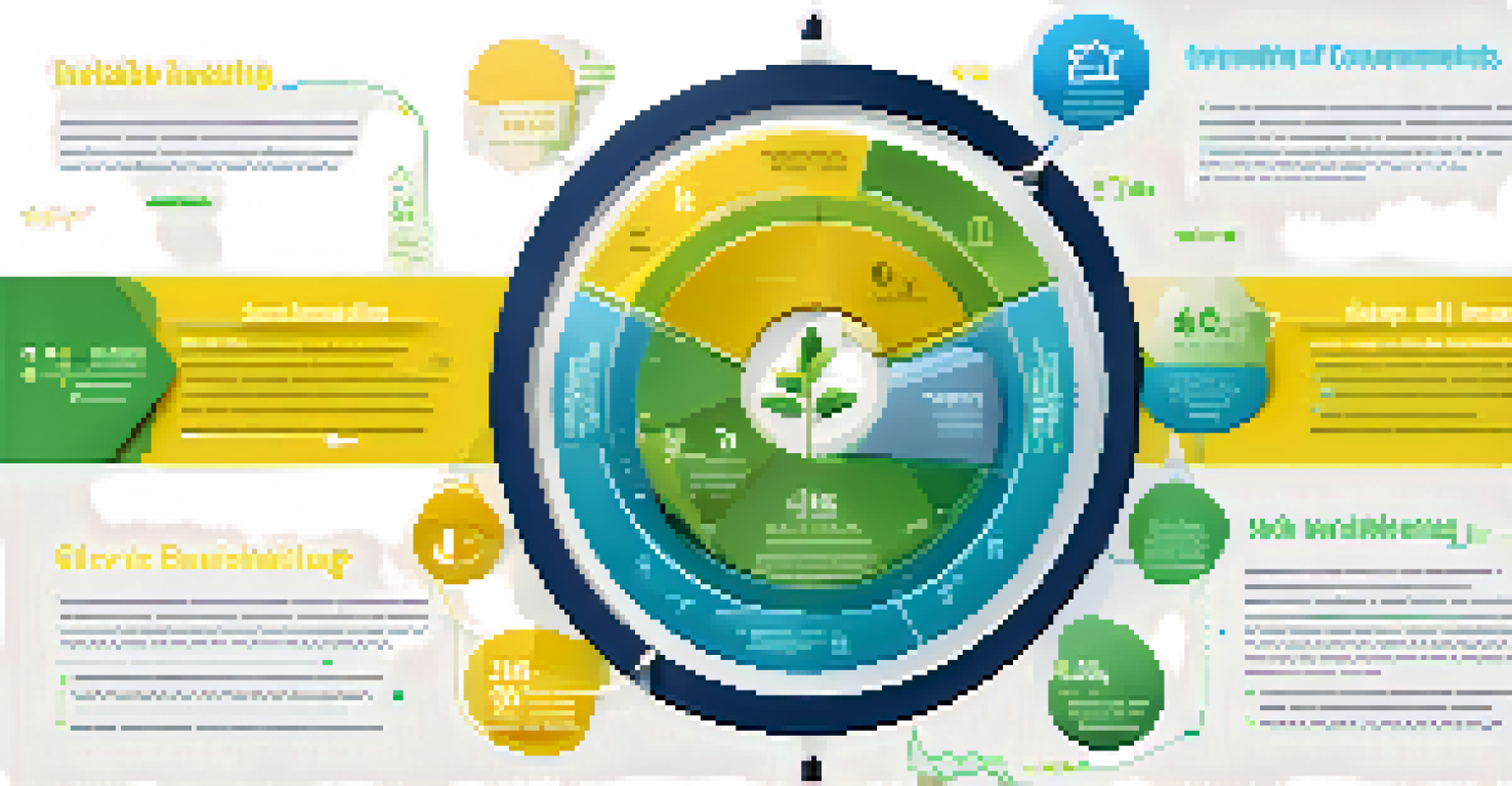The Benefits of Sustainable Investing for Long-Term Growth

Understanding Sustainable Investing and Its Importance
Sustainable investing goes beyond traditional financial metrics; it incorporates environmental, social, and governance (ESG) factors. This approach means considering how a company impacts the world while assessing its potential for profitability. By aligning investments with personal values, sustainable investing fosters a sense of purpose and responsibility in finance.
Sustainable investing is not just a trend; it's a fundamental aspect of the future of investing.
As consumers become more aware of global issues like climate change and social justice, they often seek investments that reflect their values. This growing awareness has led to a surge in sustainable investment options, making it easier for investors to support companies that prioritize ethical practices. Thus, understanding sustainable investing is crucial for anyone looking to grow their wealth responsibly.
Investors can benefit from this shift in focus, as companies that prioritize sustainability often demonstrate resilience and adaptability in changing markets. Over time, this can lead to superior financial performance, creating a win-win scenario for both the investor and the planet.
Long-Term Financial Performance and Sustainability
One of the most compelling reasons to consider sustainable investing is its potential for long-term financial performance. Studies have shown that companies with strong sustainability practices often outperform their peers over time. This trend can be attributed to better risk management and more innovative business practices, which ultimately lead to increased profitability.

Investors are increasingly recognizing that sustainability is not just a trend; it’s a fundamental aspect of a company’s long-term strategy. For instance, firms that adopt eco-friendly practices often find ways to reduce costs, such as through energy efficiency or waste reduction. As a result, these companies are more likely to thrive in a competitive market.
Sustainable Investing Aligns Values
Sustainable investing integrates environmental, social, and governance (ESG) factors, allowing investors to grow their wealth while supporting companies that reflect their values.
Moreover, sustainable companies often attract loyal customers and top talent, enhancing their overall market position. This loyalty can translate into stability and growth, making sustainable investments not only ethically sound but also financially rewarding.
Risk Mitigation Through Sustainable Investing
Investing sustainably can help mitigate risks associated with environmental and social issues. By focusing on ESG factors, investors can avoid companies that may face regulatory penalties or reputational damage due to poor practices. This proactive approach helps shield investments from sudden market downturns triggered by negative news.
The greatest danger in times of turbulence is not the turbulence; it is to act with yesterday's logic.
Consider a company heavily reliant on fossil fuels; as the world shifts towards renewable energy, this company may experience significant losses. On the other hand, a business emphasizing sustainable practices is likely to adapt and thrive. By prioritizing sustainability, investors can better position themselves against potential market volatility.
Furthermore, sustainable investing encourages companies to adopt practices that promote long-term viability, such as responsible resource management and ethical labor practices. This focus not only contributes to a healthier planet and society but also creates a more stable investment landscape.
The Rise of ESG Metrics in Investment Decisions
As sustainable investing gains traction, ESG metrics have become essential tools for investors. These metrics provide a comprehensive view of a company’s performance in environmental, social, and governance areas, making it easier to assess potential investments. By analyzing ESG data, investors can make informed decisions that align with their values and financial goals.
For example, a company with a strong commitment to reducing carbon emissions is likely to be seen positively by investors. Conversely, a firm with poor labor practices might raise red flags. By integrating ESG metrics into investment analysis, investors can identify companies that are not only financially sound but also responsible stewards of the planet.
Long-Term Gains from Sustainability
Companies that prioritize sustainability often outperform their peers, demonstrating that ethical practices can lead to superior financial performance.
This growing reliance on ESG metrics signals a shift in how investors evaluate risk and opportunity. As more investors prioritize sustainability, companies that ignore these factors may find themselves at a disadvantage in securing funding and attracting customers.
Impact on Corporate Behavior and Accountability
One of the most significant impacts of sustainable investing is the influence it has on corporate behavior. When investors prioritize ESG factors, companies feel compelled to improve their practices to attract funding. This shift can lead to enhanced transparency, better governance, and increased accountability in business operations.
For instance, companies may implement stricter environmental policies or improve their labor practices to align with investor expectations. This not only benefits the companies but also contributes to positive societal change. As a result, sustainable investing creates a ripple effect that encourages businesses to act more responsibly.
Moreover, the increased focus on accountability can lead to stronger financial performance in the long run. Companies that are transparent and socially responsible often gain the trust of consumers, which directly impacts their bottom line and fosters long-term growth.
Building a Sustainable Future Through Investment
Sustainable investing not only benefits individual investors but also contributes to building a sustainable future. By directing capital towards companies that prioritize environmental and social responsibility, investors play a crucial role in driving positive change. This collective effort can help address pressing global issues like climate change, inequality, and resource depletion.
Consider the impact of investing in renewable energy companies: by supporting these businesses, investors help accelerate the transition to a more sustainable energy system. This not only reduces reliance on fossil fuels but also creates jobs and stimulates economic growth in the sector. Such investments are a testament to the power of finance in fostering change.
Education Fuels Sustainable Choices
Increasing educational resources on sustainable investing empowers investors to make informed decisions that align with their personal values and promote positive change.
Ultimately, sustainable investing enables individuals to align their financial goals with their values, creating a sense of purpose. By choosing to invest in companies that contribute to a better world, investors can feel proud of their financial choices while working towards a healthier planet for future generations.
The Role of Education in Sustainable Investing
Education plays a vital role in promoting sustainable investing. As more investors seek to understand ESG factors and their implications, educational resources become essential for informed decision-making. An informed investor is more likely to recognize the long-term benefits of sustainable investments and make choices that align with their values.
Many financial institutions are now offering courses and resources on sustainable investing, helping demystify the process. This education fosters a culture of responsible investing, encouraging individuals to consider how their financial choices impact the world. By equipping investors with knowledge, we empower them to make a difference.

Furthermore, as educational initiatives continue to grow, the demand for sustainable investment options will likely increase. This shift can spur innovation in the financial sector, leading to the development of new products and strategies that prioritize sustainability, ultimately making sustainable investing more accessible for everyone.